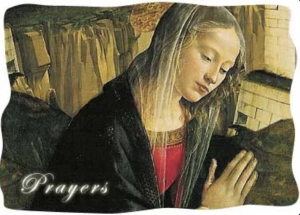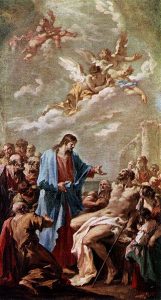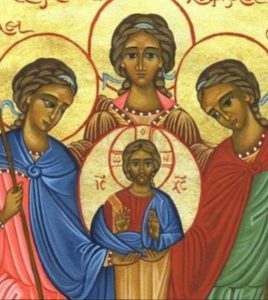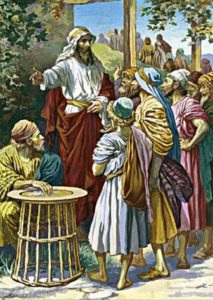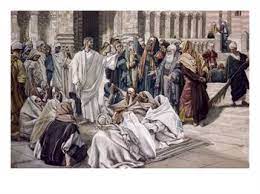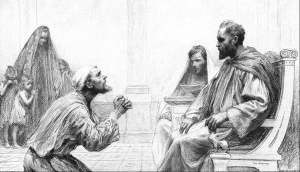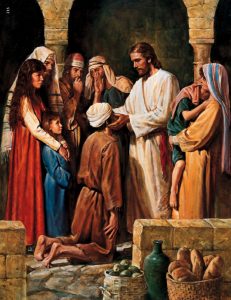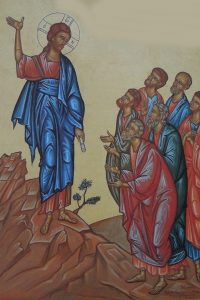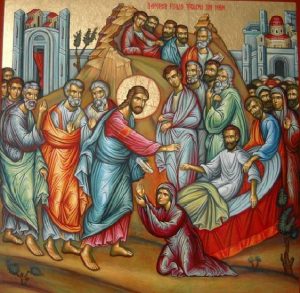Today is the first Sunday of October, the month of the Holy Rosary. I encourage everyone to please continue to recite the Holy Rosary for the reparation and for the conversion of the whole world. It is an immediate response to the many unexplained realities pulling us down to the abyss of evil. We need to get an inspiration to persevere in praying for the transformation of the world through the guidance, aid and protection of our Holy Mother Mary.
We are in the 26th Sunday in Ordinary Time, year A. Our belief in Christianity is about relationships with God and others. What matters is how we “walk the talk” rather than mere expression of words. It is about the constancy of the things we do in the right way. Today’s readings, like the first reading from the book of Ezekiel, cites to us the word of the Lord to the Prophet Ezekiel, “You say, the Lord’s way is not fair, Hear now, house of Israel: Is it my way that is unfair, or rather, are not your ways are unfair.” What a beautiful reminder from the Lord, that it is through our inequity and wickedness that we begin to tarnish our relationship with God, but our commitment to do good preserves our life.
The second reading from the letter of St. Paul to the Philippians reminds us of this piece of advice, “Do nothing out of selfishness or out of vainglory, rather, humbly regard others as more important than yourselves.” (v. 3) It expresses the fundamental attitude of imitating the humility of Jesus as the core value of our Christian lives. Jesus “humbled himself, becoming obedient to the point of death, even death on a cross.” Imitating Christ’s humility is indeed a challenge, but Jesus, both human and divine, becomes like us in all things and makes it possible to follow and imitate Him.
The gospel taken from St. Matthew is about the parable of the two sons. Beginning today, there are three consecutive Sundays where we will be hearing parables. Parables are the inspiring and earthly stories of Jesus with heavenly messages. It is interesting to know that Jesus has used ordinary and common happenings that are now happening in the world. He had grasped every opportunity to make stories which people could easily understand; however, there is a certain requirement, be first a “listener of Christ.” This parable is an opportunity for Jesus to teach the scribes and elders in Israel. There are three things I would like to delve on with this parable:
First, the two sons are required to answer, “yes or no,” to the invitation of Jesus to go and work in His vineyard. Obviously, the Scribes and elders answered a resounding “yes” because they were the first ones to hear the word of God. According to history, they were the chosen people of Israel and believed they were upright people by virtue of being recipients of God’s word. They said “yes” but did not respond to the invitations of Jesus; therefore, they never gained entrance into the kingdom. Their pride made them unable to accept Jesus, and they don’t want to belong to His mission of inaugurating the Kingdom of God.
Second, the other son responded “Nope,” to Jesus’ invitation. There were tax collectors and prostitutes. After some time, they listened to the call of Jesus seriously and then they became repented former sinners. They changed their “No” answer to a life changing “Yes” to the call of the vineyard of God.
Third, I believe that we are having lukewarm reactions to the invitation of the Lord. Maybe some of us would say “No,” when our life guarantees pleasure and comfort and when everything seems so easy and happy, unmindful of Jesus’ call to be with Him in the vineyard. However, when crises start to strike us, our negative response to God seems to be a lightning of fear and tribulation that we say, “Yes,” to the Lord.
Brothers and sisters, please let us not wait to be stricken by sickness, trials, agony, despair, brokenness, family disintegration, and natural calamities in order to change our hearts and minds to commit to Jesus. We must be realistic to be confronted with our human insufficiency and mortality. Let us deal with our lives with openness to the spirit to accept and live through the offering of Jesus’ mercy and compassion. Today’s Psalm 25:4-5, 6-7, 8-9 says, “Remember your mercies, O Lord,” I often think God will be happy if we try to live moral lives. Our journey of faith would be difficult if we cannot accept forgiveness and leave behind our recurring horrible ways. It is not yet too late to change our hearts and decide to keep God’s calling to holiness. Let us remain humble in following God’s ways. God bless you.
Fr. Arlon, osa
————————-
El Dictado del Corazón
Vigésimo Sexto Domingo del Tiempo Ordinario, Año A
- Ezequiel 18:25-28
- Salmo 25:4-5, 6-7, 8-9
- Filipenses 2:1-11 o 2:1-5
- Mateo 21:28-32
Hoy es el primer Domingo de Octubre, mes del Santo Rosario. Invito a todos a que por favor sigan rezando el Santo Rosario por la reparación y la conversión del mundo entero. Es una respuesta inmediata a las muchas realidades inexplicables que nos arrastran al abismo del mal. Necesitamos inspiración para perseverar en la oración por la transformación del mundo a través de la guía, ayuda y protección de nuestra Santa Madre María.
Estamos en el Vigésimo Sexto Domingo del Tiempo Ordinario, año A. Nuestra creencia en el cristianismo tiene que ver con la relación con Dios y con los demás. Lo que importa es cómo “predicamos con el ejemplo” y no una mera expresión de palabras. Se trata de la constancia de las cosas que hacemos de la manera correcta. Las lecturas de hoy, como la primera lectura del libro de Ezequiel, nos citan la palabra del Señor al profeta Ezequiel: “Tú dices: El camino del Señor no es justo. Escucha, casa de Israel: ¿Conque es injusto mi proceder? ¿No es más bien el proceder de ustedes el injusto? Qué hermoso recordatorio del Señor, que es nuestra inequidad y maldad lo que comenzamos a empañar nuestra relación con Dios. Pero nuestro compromiso de hacer el bien preserva nuestra vida.
La segunda lectura de la carta de San Pablo a los Filipenses nos recuerda este consejo: “Nada hagan por espíritu de rivalidad ni presunción; antes bien, por humildad, cada uno considere a los demás como superiores a sí mismo y no busque su propio interés, sino el del prójimo”. (v. 3) Expresa la actitud fundamental de imitar la humildad de Jesús como valor central de nuestra vida cristiana. Jesús “se humilló a sí mismo, haciéndose obediente hasta la muerte, y muerte de cruz”. Imitar la humildad de Cristo es ciertamente un desafío. Pero Jesús, a la vez humano y divino, se parece a nosotros en todo y permite seguirlo e imitarlo.
El evangelio tomado de San Mateo trata sobre la parábola de dos hijos. A partir de hoy, son tres Domingos consecutivos donde escucharemos parábolas. La parábola son las historias inspiradoras y terrenales de Jesús con mensajes celestiales. Es interesante saber que Jesús ha utilizado acontecimientos ordinarios y comunes que están sucediendo en el mundo. Había aprovechado cada oportunidad para dar ejemplos con las historias para que la gente pudiera entender fácilmente, sin embargo, hay un cierto requisito: ser primero un “oyente de Cristo”. Esta parábola es una oportunidad para que Jesús enseñe a los escribas y a los ancianos de Israel. Hay tres cosas en las que me gustaría profundizar en esta parábola:
Primero, se requiere que los dos hijos respondan “sí o no” a la invitación de Jesús de ir a trabajar en su viña. Los escribas y los ancianos respondieron con un rotundo “sí” porque fueron los primeros en escuchar la palabra de Dios. Según la historia, eran el pueblo elegido de Israel y se creían personas rectas en virtud de ser destinatarios de la palabra de Dios. Dijeron “sí”, pero no respondieron a las invitaciones de Jesús, por lo tanto, nunca lograron la entrada al reino. Su orgullo los hizo incapaces de aceptar a Jesús y no quisieron pertenecer a Su misión de inaugurar el Reino de Dios.
Segundo, el otro hijo, respondió “No”, a la invitación de Jesús y eran recaudadores de impuestos y prostitutas. Después de un tiempo, escucharon seriamente el llamado de Jesús y luego se arrepintieron ante los antiguos pecadores. Cambiaron su respuesta de “no” por un “Sí” que les cambió la vida, al llamado de la viña de Dios.
En tercer lugar, creo que estamos teniendo reacciones tibias ante la invitación del Señor. Quizás algunos de nosotros diríamos “No”, cuando nuestra vida garantiza placer y comodidad. Cuando todo parece tan fácil y feliz, sin tener en cuenta el llamado de Jesús a estar con Él en la viña. Sin embargo, cuando las crisis comienzan a golpearnos, nuestra respuesta negativa a Dios parece ser un relámpago de miedo y tribulación que decimos “Sí” al Señor.
Hermanos y hermanas, por favor no esperemos a ser golpeados por enfermedades, pruebas, agonía, desesperación, quebrantamiento, desintegración familiar y calamidades naturales para cambiar nuestros corazones y mentes y comprometernos con Jesús. Debemos ser realistas para enfrentarnos a nuestra insuficiencia y mortalidad humanas. Tratemos nuestras vidas con apertura al espíritu para aceptar y vivir a través del ofrecimiento de la misericordia y la compasión de Jesús. En el Salmo 24:4-5, 6-7,8-9 de hoy, “Descúbrenos, Señor, tus caminos.”, a menudo pienso que Dios será feliz si tratamos de vivir una vida moral. Nuestro camino de fe sería difícil si no pudiéramos aceptar el perdón y dejar atrás nuestros horribles caminos recurrentes. Aún no es demasiado tarde para cambiar nuestro corazón y decidir mantener el llamado de Dios a la santidad. Seamos humildes al seguir los caminos de Dios.
Dios los bendiga.
P. Arlón, osa
